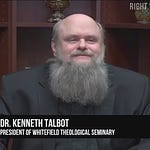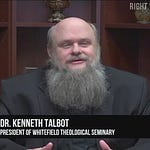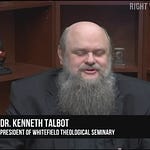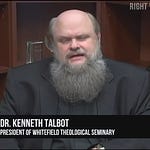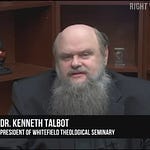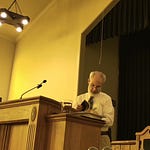A few weeks ago a seminary student sent me an AI-generated audio file. His friends had taken one of his lectures, fed it into an app, and out came a polished “podcast” hosted by a male and female voice. Out of curiosity I tried the same experiment, especially since Eric and Gary are whining about length of articles. I supplied the AI with links to my two articles on Gary DeMar and mellō, gave it the links to Gary’s responses, and uploaded the two related podcasts. I then asked the program to analyze everything and decide whether Gary had actually dealt with my arguments.
I am shocked. The AI episode lays out the shape of the discussion so clearly that I hardly feel the need to write my own summary. In just under an hour it tracks most claims, compares the evidence, and shows that Gary repeatedly sidesteps the central points. I am surprised at how accurately it captures the flow of the exchange.
One clarification the episode misses deserves mention, and I understand why it slipped through. The AI would have had to follow a link embedded in Gary’s article and verify his citation. Gary writes: “If a Greek student were to follow William Mounce’s Basics of Biblical Greek, he or she could translate mellō as ‘I am about to,’ since that is the definition he gives. Mounce’s online dictionary lists ‘to be about to, on the point of; to be destined, must; to intend to; (what is) to come, the future’ for Acts 24:15.”
That final sentence is misleading. Mounce does not assign all of those glosses to Acts 24:15. The list appears as the full range of possible meanings for the verb in general. When you scroll down to the Greek–English Concordance entry for Acts 24:15 you find the specific rendering: “having a hope in God, which these men themselves accept, that there is (mellein, present active infinitive) to be a resurrection of both the just and the unjust.” The concordance does not insist on imminence in this verse.
This is another instance of Gary’s careless use of his sources. Apart from that, the AI’s breakdown is spot-on and well worth your time.
Add: After listening to this again, there’s one more point I want to address. Eric and Gary suggested that my comments about “cherry-picking” were meant to imply that I do not think people should reference commentaries to support their views. I never said that. I do the same thing in my own articles and sermons. In fact, the AI analysis picked up on this nuance.
What it failed to mention, however, is that in one of the podcast episodes, Gary actually admitted that the commentaries he referenced do not explain why they chose to translate mellō as “about to” and its implication. That was precisely my point! It does no good to cite someone who renders mellō as “about to” if they never explain why or what that implies. Even Gary acknowledged that his sources don’t provide that explanation. So, thank you Gary.
At one point in the podcast, Gary speculates about possible implications of his view. He suggests that “about to” in Acts 24:15 suggests that the resurrection meant Old Covenant saints—who had died and gone to some underworld realm called Hades—were raised to heaven in A.D. 70 to receive their “resurrection body.” But if that is the case, then we must re-examine and reject another teaching: what exactly happened to Old Testament saints when they died?
Apparently, according to Gary, they did not go to heaven. What makes this even more ironic is that both he and Eric have accused Reformed Christians—who believe in an intermediate state—of promoting a kind of Gnosticism, because in our view people can exist for a long period without a physical body. Yet it seems to fly right over their heads that their own view implies the very same thing. According to them, Old Covenant saints had no resurrection body until A.D. 70. So, by their own definition, their view is guilty of the very problem they claim to reject. They just made Gnosticism acceptable pre-70AD. And accusing us of Gnosticism does not even make sense, because in the Christian view, we WILL eventually receive our physical, fleshly bodies again at the resurrection. That is not Gnosticism —that is the biblical hope. Their view, however, leaves the fleshly body in the ground forever, never to rise. That is the real problem. That’s the point behind the charge of Gnosticism. Clearly, DeMar has not thought this through carefully.




